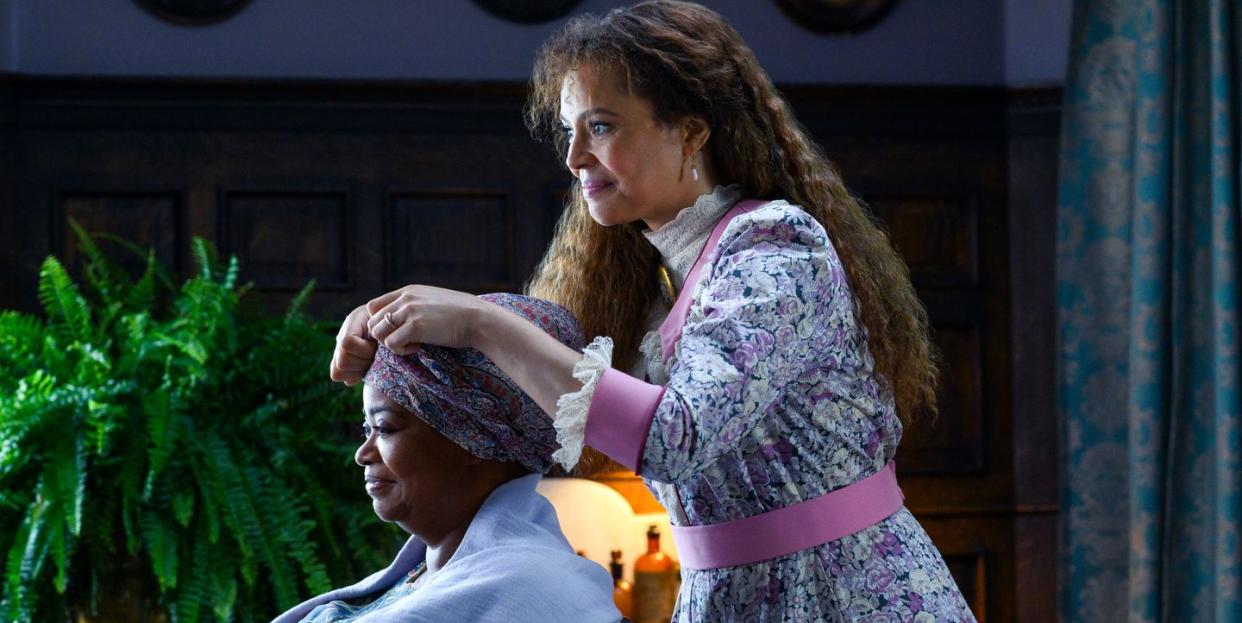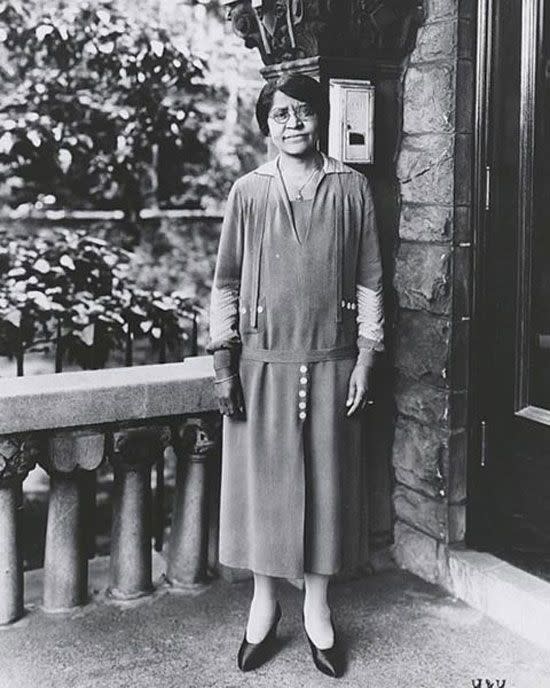Netflix's 'Self Made' Didn't Get Everything Right About Addie Monroe

The new hit Netflix series Self Made follows the story of Madam C.J. Walker (real name: Sarah Breedlove), a young woman during the turn of the 20th century who wanted to become a salesperson for Addie Monroe’s hair-care products after they helped her hair grow back.
In the series, Addie tells Sarah she's not attractive (read: light-skinned) enough to sell her products. Well, that was all it took to push Sarah to go off and create her own line of products (as one does) under the name Madam C.J. Walker, which sold ridiculously well. So well, in fact, that Sarah ended up being considered the wealthiest self-made woman in America (and the first self-made millionaire, per Guinness World Records) when she died.
Still, the Addie Monroe vs. Madame C.J. Walker feud isn't totally true to real life (the series is based in fact, but let's just say Netflix took some liberties). The character of Addie Monroe, for starters, is actually based on Annie Turnbo Malone, who had a successful hair-care business that Sarah was involved in before she set out on her own. Here's what you need to know about the real-life 'Addie Monroe' and her relationship to Madame C.J. Walker.
So, who was 'Addie Monroe,' a.k.a. Annie Malone IRL?

Annie was considered a pioneer in the African American beauty industry, according to the National Museum of African American History and Culture. She invented a line of hair products called Poro in the late 1800s and early 1900s that did a slew of different things, like improving scalp health, promoting hair growth, and straightening hair.
According to the National Museum of African American History and Culture, Sarah was, in fact, one of Annie’s salespeople. And, yup, the two definitely had a falling out, according to the website of A'Lelia Bundles, Sarah’s great-great-granddaughter who wrote a book about Madame C.J. Walker's journey.
"Not long after she married Charles Joseph 'C. J.' Walker in early 1906, there was a rift of some kind between the two women that caused Madam Walker to sever ties with Malone," Bundles wrote. "By April of 1906, Madam Walker was selling her own line of hair care products."
Was there actually a colorism feud between Annie and Sarah?
In the Netflix series, Annie's character, Addie Monroe, tells Sarah that she'd never want her selling her products. Addie says she prefers to hire lighter-skinned black women who look like her, so they'll have a better chance of making a sale. "Colored women will do anything to look like me. Even if deep down they know they can't," she says.
But, actress Jodie Turner Smith pointed out in a tweet earlier last week that Sarah and Annie didn't disagree over Sarah selling Annie's products because of the color of her skin. In real life, Annie was actually a darker-skinned black women.
but being that the Addie Munroe character was based on actual person Annie Malone, WHO WAS ALSO DARK-SKINNED (!!!), i’m trying to understand why it was necessary to create a rivalry between these 2 successful female entrepreneurs & make it about skin colour... (2)
— Jodie Turner-Smith (@MissJodie) March 23, 2020
What happened to Annie after her rift with Sarah?
Despite the unknown, real-life fallout between the Annie and Sarah, Annie was still wildly successful. She ended up opening the Poro College in St. Louis, Missouri, in 1918, according to the Annie Malone Historical Society. And by the 1950s, there were 32 Poro Colleges.
Annie also launched the Annie Malone Children & Family Service Center, which still provides social services, educational programs, and advocacy for children, families, and the elderly. Her philanthropy also extended to the St. Louis Colored YWCA, which she donated thousands to help build, and the St. Louis Colored Orphans' Home.
What about Annie's husband?
In the Netflix series, it's implied that Addie's husband was abusive. That hasn't been confirmed of the real-life Annie Malone. But her eventual split from her husband was the cause behind the financial setback her company faced in the 1920s.
According to University of Illinois' historical archives, Annie was worth $14 million around that time. But she hit a roadblock in 1927 when her husband and business partner, Aaron Malone, filed for divorce and asked for half of the company. He claimed that Poro's success was a result of his political contacts. The two eventually settled to the jaw-dropping amount of $200,000. Annie retained full ownership of the Poro Company, but it definitely made a dent in her pockets. Eventually the entrepreneur was able to get back on her feet, running the Poro Company until her death in 1957—nearly 40 years after Sarah.
Self Made is streaming on Netflix now.
You Might Also Like

